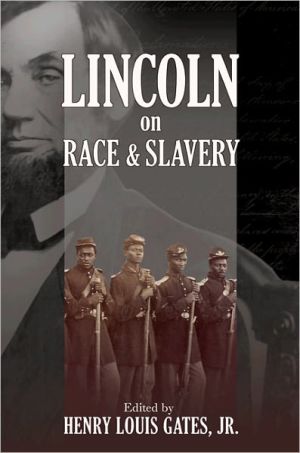

 |

|

The average rating for Lincoln on Race and Slavery based on 2 reviews is 4.5 stars.
Review # 1 was written on 2017-06-25 00:00:00 Herbert Hennes Herbert HennesSomeone close to me kept accusing Lincoln of racism, so I wanted to know the story! Henry Louis Gates compiled this documentary history of Lincoln's positions on slavery and race. He sees a gradual change in Lincoln's positions on race. Here's how I would summarize what I read here: Lincoln always opposed slavery, on the grounds that it was a moral evil. He always understood African Americans to be human beings. Through most of his political career, he seems to have believed in black inferiority, but that didn't stop him from wanting an end to slavery. In fact, it seems like he regularly used racist tropes and jokes as a way to emphasize the inherent wrongness of slavery. What's interesting was that this tactic resonated with white Americans. As a political matter, Lincoln had many schemes to avoid conflict while still getting the US out of slavery. At the beginning of his career he was even anti-abolitionists. As his thinking on the evils of slavery progressed, he was in favor of helping blacks colonize other countries. He essentially wanted to get rid of slavery in any way but the one he did: by leading the country through a civil war, allowing blacks to enlist in the army, emancipating slaves in the areas controlled by the US, and so on. In his own time, African American thinkers in the north did not trust Lincoln to do the right thing. They were right! His priority was white people's moral development and the democratic character of the country. Looking at the documentary evidence now, though, it seems inevitable that it had to go this way. A thoughtful, idealistic person, even if he was a racist, could not hate slavery (which he did) and hang on to racism. Though I suspect he told irritating racist jokes, which apparently people found funny, not sure why, to the end of his life. We can't either, you know. We can't go on like this, with two systems of justice. It's breaking our society. We're going to have to get over it, just as Lincoln did. |
Review # 2 was written on 2014-03-22 00:00:00 Andrew Davis Andrew DavisThis brief book gathers together almost all Lincoln's writings through his life, public and private, that relate specifically to slavery or race. That alone makes it valuable, though without Lincoln's complete writings available online, in modern edited form, not essential. However, the introductory by Dr. Gates, is a superb essay on the subject of Lincoln and Slavery, and how contemporary and subsequent African-Americans have dealt with the subject of Lincoln and Race. It's given me a lengthy reading list to explore in the future, for instance. There's one particular idea, one way of thinking about Lincoln, that struck me as new and important: Lincoln's own thinking on slavery and African-Americans cannot be handled under the single idea of race, which is how we modern Americans instinctively approach it. Instead, there are three categories that existed in Lincoln's mind that were capable of being almost completely separate: the issues of slavery, colonization, and the welfare of blacks themselves. Thus Lincoln can be seen opposing slavery from the earliest time in his life, without any implication of racial equality--indeed, an explicit opposition of racial equality until the last years of his life. There could be the ridiculous, sometimes romantic notion, that Americans could pursue their historical destinies and blacks could manage their own without our interference, if only every African-American could be convinced to move to Liberia, or Haiti, or Panama and leave white America to themselves. It's a very perceptive approach to reading Lincoln's own writings, which fill the rest of the book. On those, Gates lets Lincoln speak for himself, but the chapters give useful headings of the historical context, sometimes with particularly notable passages highlighted. A useful book. Dr. Gates apparently also narrated a public TV series on Lincoln, which is where his idea for the book arose. I haven't had cable since the mid 90s, but am planning to to look this up on netflix or amazon prime in the future. |
CAN'T FIND WHAT YOU'RE LOOKING FOR? CLICK HERE!!!